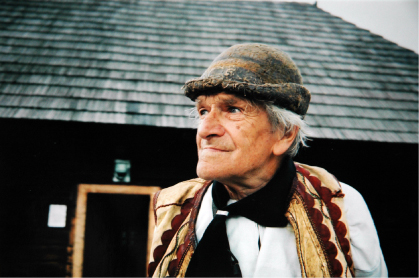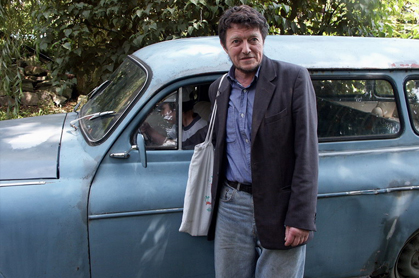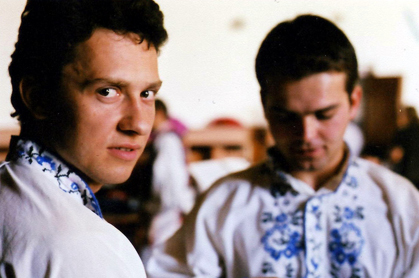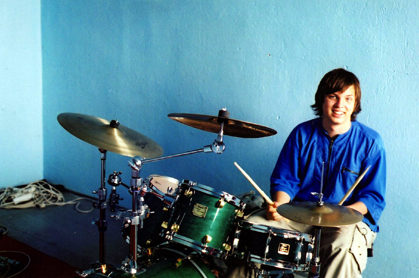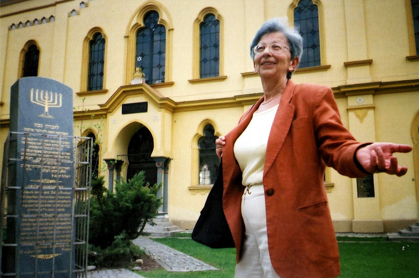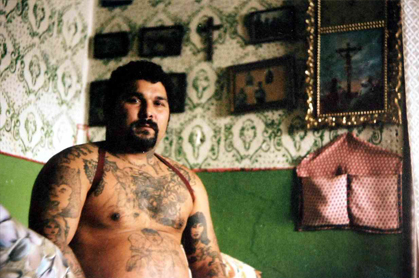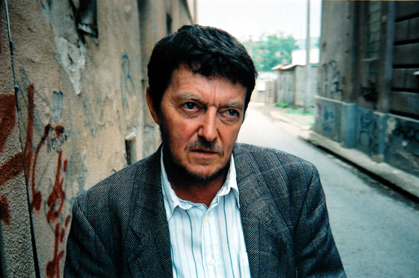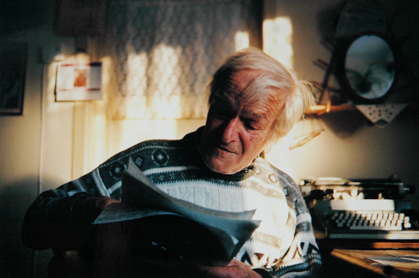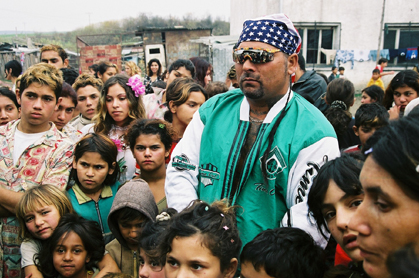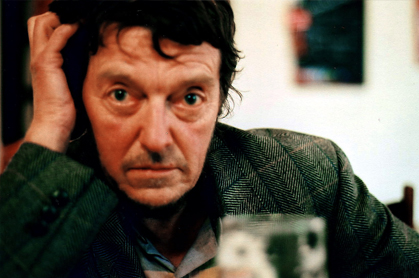About the film
„Other worlds“ is a new slovak and czech full-length documentary about originality in one of the little corners of European Union, the slovak region called Šariš, in times of globalization. The film presents stories of „six heroes at the end of the world, at the end of the globalizing world“ and its sub-title states ´made in Šariš´.
The director, Marko Škop talks about Šariš, that spreads at the east Carpathians foothills and he calls it one of the last little babels of our planet. „The big babels are new york, or paris but the diverse mix of nations and religions in the little territory i am talking about has been created slowly and gradually by the tradition and most importantly always in the background. The region has a special charm also because of its position on the border dividing eastern and western europe, it creates an original borderline between western rational individualism and the expressive emotionality of eastern nations. That could be one of the reasons why the easterners in slovakia are considered slightly different when compared to the rest of the country and could explain why they are often called „the crazy easterners .“
Other worlds is a film about a space that is progressively changing its character. According to Škop: „the originality of traditional communities disappears, but we´ve been trying to portray the unique beauty that characterizes an interesting and authentic individual.“ There are six fates of quite a different range of characters unfolding in the movie. „Since we wanted to talk about „other worlds“ we had to build a varied scale of people representing these worlds,“ he says. „The present times and the place of the individual characters in it is perceived differently by a Šarišan, a Rusyn, a Roma and a Jew. The film opens with a frame of 84 year old Ján Lazorík from village of Krivany who represents the effort to fight for identity of traditional community in the gradually globalized world. Lazorík climbes the ruins of an ancient Šariš castle and once on top, he says: „i am here to cry out as biblical prophet Isaiah about the perdition of mankind. For instance, there is a magazine in my village, it´s published by schoolkids and they have such poems there like: „We are five aces, we have pretty faces, we drink Pepsi, we wanna be sexy.“ It is receding from the principle and the meaning of creation of the world and man in it.“
Here is what the director, Marko Škop says about the opening scene: „the emotion present in the scene suggests that we have been trying to make a movie that would be wise in its own way but funny and entertaining at the same time. Other worlds is also a bit absurd, just as much as life itself. In the end, the viewer is going to see a kind portrait of eastern Slovakia even though the outlook might be quite sad at times.“
Director of photography Jano Meliš: „this film, if i were to speak just for myself, has made me familiar with the world that starts somewhere at the last gas station in the city of Poprad and spreads further on. And it is a different world from what i used to think. The variety of particular situations we have come across with when we were shooting are only to be found in eastern Slovakia, and we tried to get them at least partially into our movie. For me, for instance, an unforgettable experience was the ride to the football match with fedor vico in his thirty year old Škoda Octavia, when in one of the curves the door on my side flew open and it was hanging by the hinges, and me with the camera in my hands... You don´t forget that sort of thing.“
Commenting on the production of the movie, Meliš adds: “originally we intended to shoot the film on 16 mm format and then copy it to 35 mm film. But for the demanding subject and insufficient financial means we decided to shoot it on mini dv camera, using „25p progressive mode.“ After colour corrections in avi studio we did film recording on 35mm intermediate in Studio Mirage and then at last we had the prints made in Barrandov Studios, Prague. This procedure enabled us to use as much material as possible during the shooting and it made it possible for us to produce a 35 mm print – cinema screening format.“
It took three and a half years to produce the film from the first storyboard till the version that is screened in cinemas now. By the end of 2003, after one year and a half of work,the research had been completed and the preparations for the script concept started. The project had been awarded the Tibor Vichta Award for the best Slovak documentary film script. The following year and a half the continuous shooting took place where the stories of some of the characters were influenced by the ups and downs in their actual lives. Already during the shooting some of the postproduction work had started and it was finished by the end of the year 2005.
The premiere of the Other worlds took place on February 15, 2006 in Bratislava and on February 17, in Prešov and its was showed on the czech tv for the first time on april 12. The film appeared in the international competition during the IFF Karlovy Vary on july 5, 2006.
About the characters
Marko Škop about the main character of Ján Lazorík from the village of Krivany: “at the age of 84 he is apparently running on atom batteries. He has his own philosophy based on the meaning of creation in its diversity. He says, that just like in wild nature there is biodiversity - a different bush here, different bird there, different little beetle here- also various communities of people have always been different to one another and should admire each other for different languages, costumes, habits. Lazorík places the responsibility for the impact of the consumer ways of present day life on the big city artists, on church and television of stupidity.“ Ján Lazorík is also the last person who can dance a distinctive local dance called „the perishing of a sheep,“ where he imitates the dying of a sheep. All his unbelievable energy is directed towards preserving as much of the old tradition as possible.
The Rusyn Fedor Vico is quite disappointed by the fact that the majority of Rusyn nation is dispersing in the majority of Slovak society. Vico declares the necessity of fighthing for the Rusyn restoration and he observes the assimilation of the Rusyn „nation of doves,“ that cares only little for its self-determination. In spite of all his pessimism, he can´t help getting deeply involved with the activities of rusin minority. And so for instance he coaches the local rusin football team Karpatia, however, paradoxically, most of the players are gypsy kids.
Before the WWII., every fifth inhabitant of Prešov was of Jewish origin. From four thousand jews there are sixty left today. Katarína Hrehorčáková runs a kosher household and so she has to travel as much as 40 kms to the bigger city of Košice where there is a kosher butcher. She says: „the interesting thing is that in Prešov they have a poultry factory and they come all the way from košice to slaughter poultry in kosher manner, then they take it to košice and i have to travel all the way from Prešov to buy it there in the kosher butcher´s shop. The meat comes approximately double price compared to the sales in supermarkets, but the people wouldn´t understand why i should buy this and only this sort of meat for my kitchen.“ The gynecologist Katarína Hrehorčáková has helped to give birth to hundreds of children, only two out of the total were of Jewish origin. In these times of globalization, also her own kids went to look for new job opportunities abroad and they will probably never come back to live in Prešov. It seems that when her generation leaves, the Jewish community in the city will simply vanish.
Ignác Červeňák is a Roma from the village of Svinia. He spent 14 years in jail, sentenced for light as well as serious bodily harm. Today he works as an assistant to the local police guards in one of the poorest roma settlements in Slovakia. At the age of forty he started to perform rap and he plans to break through with his music. In the film, Červeňák says: „when the people heard me rapping, they said: this is a hell of a dangerous song, the Chinese in the satellite TV rap the way you do now.“ His song Apacuka fundaluka as well as its video, was broadcasted in a popular TV music show Dekahity. However, what brought more media fame to Červeňák was the fact that he informed the authorities on the village usurers and the news got all the way through to the main news on TV. After the feature had been broadcasted in the main news, the police investigation has been stopped for lack of evidence and the whole settlement stood up against Červeňák, including his own father and brother. The dream of better life as seen on tv dispersed in the reality of collective life of romas.
A couple that closes the circle of characters presented in the film is a pair of young people: the folk dancer Tono Triščík has a wife and a baby girl. They live in their parents´ place but his goal is to have a place of his own, in one of the new department blocks. His job is not a very lucrative one and so he is considering finding a job abroad. „I´d miss our folklore for sure,“ admits Triščík. „But one has to fall straight into the reality to find out what it really feels like.“
Stano Čorej is a son of an entrepreneur and many people perceive him through the prism of money. He is a young, modern man. He plays music, writes lyrics and plays guitar in a pop-rock band called Nuda (Boredom). „At first we just called our band that, for no particular reason, but eventually it gained meaning by representing the way of life around here. One always gets bored here,“ Čorej says.
The stories of individual characters cross each other in other worlds and create a structural mosaic.
